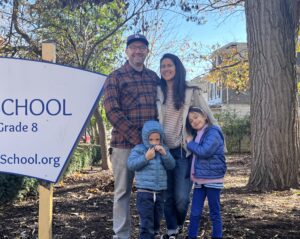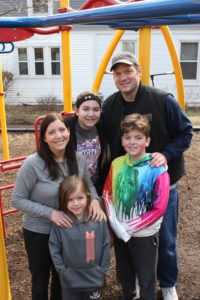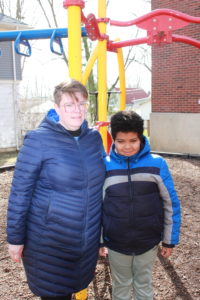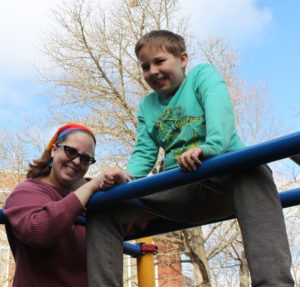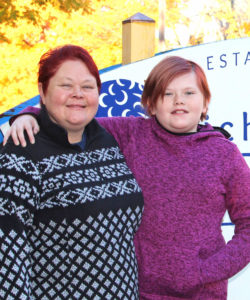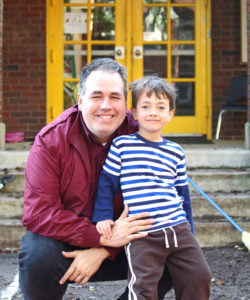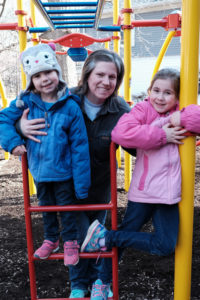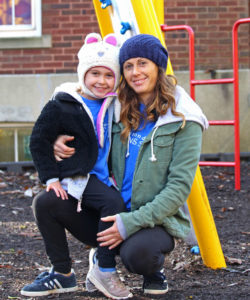The primary focus of the kindergarden program is on developing confidence and competence in all areas of development, including intellectual, emotional, social, and physical. We believe that young children learn best by being actively engaged in their learning. The children are exposed to a variety of hands-on activities that provide opportunities to practice and explore the concepts in this curriculum. The traditional curriculum areas are described separately, though many of the activities that promote them are integrated. For instance, a cooking project might incorporate some written language in the recipe, some math in the measuring of ingredients, some science as the chemistry happens, and social interaction as the children organize turns for stirring.
The program places a major focus on developing social skills but encourages the development of critical thinking skills and communications skills, as well as the gathering, observing, organizing, and recording of information. Opportunities are provided for independent and cooperative learning and for taking responsibility for the positive functioning of the class.
An important goal of the Kindergarden program is that children learn how to acquire knowledge and that they love to be engaged in this process.
Language Arts
The language arts program is designed to foster a love of reading and writing and to develop a foundation of basic language skills. Many books are read to the children as well as “shared readings” of Big Books, poems, songs, and chants. A variety of structured activities, informal materials, and games are used for skill acquisition and reinforcement. The writing and drawing process forms an important part of the language arts curriculum. This process encourages children to illustrate and learn to write their own stories, using “invented spelling,” and then to read their stories to others. We work on developing receptive and expressive language:
Receptive language: listening and reading
- Learning to be listeners
- Listening with understanding and following directions
- Sharing in circle time
- Being exposed to
- fiction
- non-fiction
- poetry
- word books and picture books
- Enjoying a variety of different authors and illustrators
- Developing emergent reading skills
- Reading early-reader books
- Reading one’s writing, peers writing, and print in the room
Expressive language: writing, drawing, and speaking
- Sharing in circle time
- Speaking clearly and in complete sentences
- Describing personal experiences
- Expressing observations
- Verbalizing feelings
- Communicating with peers
- Developing vocabulary
- Making up stories
- Describing experiences through picture drawing and/or writing
- Recognizing letters
- Developing phonemic awareness
- Using inventive spelling
- Using print in the room
- Using sight word knowledge
- Using journals: scientific recordings or personal journals
- Creating plays and puppet shows
- Beginning letter writing
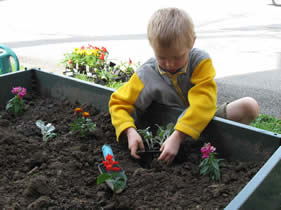
Math
The math curriculum focuses on beginning exposure to concepts through everyday events and activities and through the use of manipulative materials. The manipulative materials are used in free exploration and in guided and directed use. Children learn to communicate orally about their work, by describing relationships, making predictions, and using mathematical language, such as, more than, less than, and equal to. Children also record observations using concrete objects, pictures, and numbers. We include work with:
- Sorting and classifying
- Comparing
- Recognizing and creating patterns
- Counting
- Graphing
- Developing number sense
- Working with measurement
- Working with place value
- Estimating
- Working with geometric shapes
- Developing spatial sense
- Problem solving
- Beginning number writing
- Beginning work with operations
Science
Science is integrated into many aspects of our program and is closely connected to our work with math. Topics of study are often determined by student interest. Examples might include dinosaurs, insects, zoo animals, birds, lifecycles, worms, water, and simple machines, to name a few. The goal is to encourage children to develop an understanding of scientific thinking and to help them begin to make sense of their natural and physical environment. This is done through actively exploring materials in open-ended investigation. Field trips are often an integral part of science discovery. We engage children in:
- Exploring
- Developing inquiry
- Experimenting
- Observing
- Classifying
- Predicting
- Interpreting
- Recording data
- Problem solving
- Communicating as a scientist
- Caring for plants and animals in the classroom
- Cooking
Social Studies
Social Studies is integrated into all aspects of the daily program. The social network among the children is an important part of social studies. Through our daily activities and interactions, children develop an understanding of themselves within the group. Developing an awareness of self and self in relationship to others as part of a larger community is an important goal. This awareness is a beginning step to an understanding that leads to the ability to evaluate situations, explore options, make decisions, and effect change. Our social studies includes:
- Looking at community within the classroom and school
- Taking responsibility for the well-being of our community
- Looking at how we are alike and different from one another
- Recognizing and respecting differences
- Learning about people of different places and cultures
- Using outside community resources, field trips, and speakers
- Developing study themes based on children’s interest
- Study themes might include community workers and community places, transportation, and a specific country and culture
Arts
The arts are incorporated in the classroom in many ways. Children are encouraged to explore their ideas and creativity and begin to appreciate art as a means of expression.
Fine Arts
We encourage children to work with creativity and design. A variety of media is introduced and made available in the classroom for exploration and for use with various projects. These materials include:
- Tempera paint
- Watercolor
- Colored construction paper
- Junk for sculptures
- Drawing markers
- Crayons
- Glue
- Scissors
- Clay
- Stencils
- Finger paint
- Printing
- Collage materials
- Bookmaking supplies
- Yarn and sewing/weaving materials
Music
The goal is to help children feel comfortable and enjoy singing or listening to music as part of their everyday life. Earlham College music students often work with us, leading us in group singing accompanied by an instrument. Activities include:
- Singing in the classroom
- Listening to tapes
- Going to music concerts
- Playing rhythm instruments
- Combining movement and music
- Recognizing and creating rhythms
Performances
Children performing through plays, puppet shows, musical performances, and exhibition of projects or individual work is encouraged as part of our curriculum. We also attend performances by outside performers.
Spanish
Our Spanish teacher is with our classes twice a week for 30 minutes. Students are exposed to:
- Greetings
- Counting to 10
- Colors
- Shapes
- Family
- Body parts
- Foods
- Animals
- Songs
- Playing Spanish games
- Learning about the culture
Social and Emotional Development
The social and emotional development of the child is a primary focus of the kindergarten curriculum; it is embedded in all that we do. A major goal is to have children become confident and competent participants in the classroom and to be children who love to engage in learning. We work with:
- Developing self-confidence
- Developing self-control
- Making good choices and following through
- Developing good work habits
- Cooperating with others
- Being a responsible part of a group
- Respecting others
- Respecting differences
- Working independently and in large or small groups
- Expressing needs, feelings, and emotions
- Working at constructively resolving conflicts
Physical Development
Throughout the day the children are given many opportunities to practice developing small and large motor skills. Health and nutrition, along with physical exercise, is incorporated into our discussions and readings about taking care of our bodies. Guided instruction is scheduled several times a week for physical education, and outside free play becomes an important part of the day for active exploration. Sharing equipment and good sportsmanship are emphasized. Activities include the following.
Large Motor Skills
- Running
- Jumping
- Climbing
- Throwing and atching balls
- Bouncing and dribbling balls
- Kicking balls
- Hopping
- Skipping
- Stretching exercises
- Traveling and moving in different pathways and with different speeds
- Balancing
Small Motor Skills
- Drawing
- Writing
- Painting
- Working with clay and playdough
- Cutting
- Gluing
- Sewing
- Building with manipulative toys
- Developing self-help skills, dressing oneself, buttoning, zipping, etc.
Technology
Children are exposed to a variety of instruments that are used to extend and support learning in the different curricular areas. These include:
- CD players
- Microscopes
- Computers
Assessment
Assessment is an important part of the learning process and is a constant part of our daily activity.
Children’s Self-Assessment
We encourage children to self-assess as they explore and experiment. The following questions are used to help children begin to think about their own work and play and interactions with others. What did I do? How did that work? How did I do? What can I change?
Children’s Work Folder
The children collect their writing and drawing work in a folder and review it with the teacher’s help. Children are encouraged to select pieces of work that will become part of a permanent portfolio that will be maintained from year to year as they go through school. This portfolio then becomes a representation of their growth and progress over time.
Teacher’s Assessment of the Children
The teacher’s assessment is ongoing. This is accomplished primarily through observations of their work and play but also through conversations, interviews, conferencing, and checking written work. This is recorded through anecdotal notes and checklists. Parent/teacher conferences are conducted in mid-fall and early spring; twice a year the teacher provides a written report assessing the child’s progress to the parents.

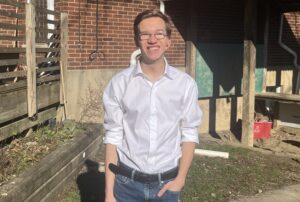
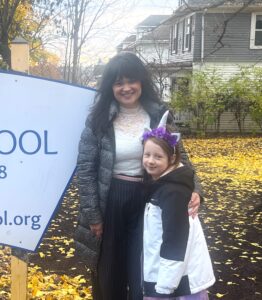
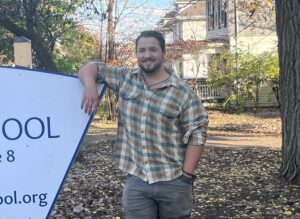 "When we place nature at the center of our community, we come to realize the true abundance of the world we live in. This school puts these seeds of hope in its students; it changes how they move through the world, and it changes the communities they enter for the better.”
"When we place nature at the center of our community, we come to realize the true abundance of the world we live in. This school puts these seeds of hope in its students; it changes how they move through the world, and it changes the communities they enter for the better.”